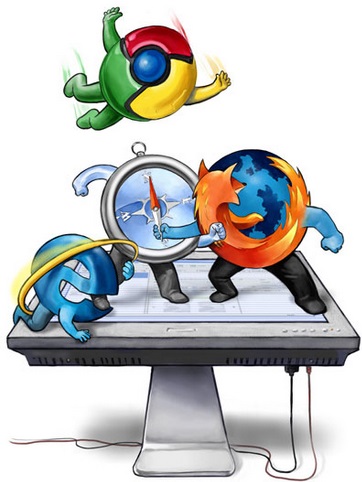Can Vivaldi and Edge blunt Chrome’s dominance?
The history of the internet has been coloured by the wars of the web browsers. During the 1990s Netscape Navigator was the undisputed king of the web browsers, but by 2002 it had lost its crown to Internet Explorer. The 2002 launch of Firefox and the 2003 launch of Safari were, in hindsight, a sign of web browsers to come, but at the time it seemed that nothing could seriously challenge IE’s dominance, not even the 2007 launch of the iPhone, which brought Safari to a whole new market. Then in 2008, Google launched Chrome, which became a sensation.

Chrome quickly outshone IE in the war of the web browsers
In its basic form, Chrome has a light footprint and a basic feature set. This means that it not only runs well on the low-price/low-spec PCs which form a mainstay of the consumer market, but also runs smoothly on smartphones and tablets, creating a seamless user experience across devices. Faced with diminishing market share and the realization that mobile support is crucial to the success of the current generation of web browsers, Microsoft abandoned IE and launched Edge.

Edge only looks like IE – the two web browsers are very different
Edge’s look and feel will be immediately familiar to anyone who’s used IE. Peer under the surface however and it quickly becomes obvious that these are two very different web browsers. IE supported legacy technologies (such as Active X), Edge does not. IE had a plethora of features available from its famous toolbar, Edge has a very minimalistic interface. IE was notoriously resource intensive, Edge has a feather-light footprint. IE was essentially a stand-alone piece of software, Edge is integrated with other parts of the Microsoft ecosystem such as Cortana and One Drive. Edge has been launched as the default browser with Windows 10 and so now the question is whether or not Microsoft can use its dominance in the desktop/laptop market to make it the success IE once was. At current time, Edge is essentially in the same league as the other “known-but-niche” web browsers such as Dolphin, Silk, Opera and the newcomer Vivaldi.
Vivaldi is rewriting Opera – it's bringing its own tune to the war of the web browsers

Web browsers can’t please everyone and when Opera upset a section of its fan base, they worked to create Vivaldi, which is the latest significant contender in the wars of the web browsers. Learning its lessons from the most successful current web browsers Vivaldi’s interface is simple enough to please users who just want to get online but has enough advanced customization setting to please those who want to make the most of their web browsers. Casual surfers can stack and tile tabs and make the most of numerous intuitive shortcuts including those which can be controlled by swiping a finger or a mouse. Those who want to do some serious reading can opt for the Chromeless UI to remove all distractions.
The Chrome and Safari web browsers still have Android and iOS behind them
Whatever the technical pros and cons of the various web browsers, the fact of the matter is that Chrome and Safari are both integral parts of the world’s leading mobile operating systems. Microsoft will doubtless be hoping that Windows still has enough of a following to make it a viable contender in the mobile arena. It remains to be seen whether other, niche, web browsers like Vivaldi can go mainstream without the benefit of a tie-in to a popular ecosystem.
Go To | New memory chips use light to store and transmit data 100 times faster than SSD
New memory chips use light to store and transmit data 100 times faster than SSD - See more at: https://www.goliveuk.com/blog/entryid/87/memory-chips#sthash.xVaAdYhF.dpuf
New memory chips use light to store and transmit data 100 times faster than SSD - See more at: https://www.goliveuk.com/blog/entryid/87/memory-chips#sthash.xVaAdYhF.dpuf
New memory chips use light to store and transmit data 100 times faster than SSD - See more at: https://www.goliveuk.com/blog/entryid/87/memory-chips#sthash.xVaAdYhF.dpuf
New memory chips use light to store and transmit data 100 times faster than SSD - See more at: https://www.goliveuk.com/blog/entryid/87/memory-chips#sthash.xVaAdYhF.dpuf
New memory chips use light to store and transmit data 100 times faster than SSD - See more at: https://www.goliveuk.com/blog/entryid/87/memory-chips#sthash.xVaAdYhF.dpu
New memory chips use light to store and transmit data 100 times faster than SSD - See more at: https://www.goliveuk.com/blog/entryid/87/memory-chips#sthash.xVaAdYhF.dpuf